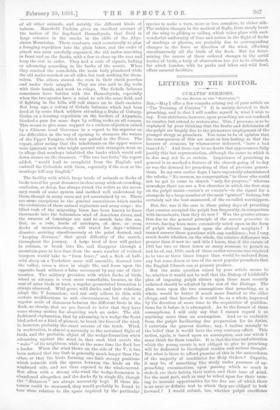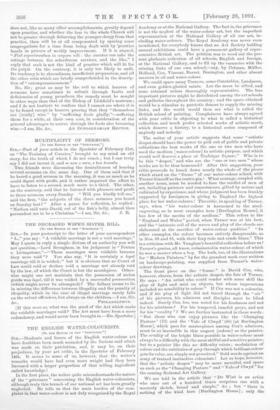LETTERS TO THE EDITOR.
CURATES' SERMONS.
[TO TEM EDITOR 05 THE " BPECT4T011•1 Silt,—May I offer a few remarks arising out of your article on "The Training of Curates" ? It is mainly devoted to their preaching, and to that I will confine myself in what I wish to say. Your strictures, however, upon preaching are not confined to curates, but extend to rectors also. This, I presume, is to be explained by your thinking that the faults and deficiencies of the pulpit are largely due to the premature employment of the younger clergy as preachers. You seem to be of opinion that the consequences of this are more or less lasting, BO that the hearers of sermons, by whomsoever delivered, "have a bad time of it." And there can be no doubt that appearances fully justify this last representation, although the cause to which it is due may not be so certain. Impatience of preaching in general is as marked a feature of the church-going of to-day as was the demand for preaching of that of previous genera-
tions. In my own earlier days, I have repeatedly administered the rebuke, "No sermon, no congregation," to those who could not be got to come to church "only for prayers ; " whereas nowadays there are not a few churches in which the first step on the pulpit stairs—rector's or curate's—is the signal for a stampede by a, large number of the most "genteel" looking, but certainly not the best-mannered, of the so-called worshippers.
But, Sir, was it the case in those palmy days of preaching that curates occupied the pulpit less frequently, in comparison with incumbents, than they do now ? Was the greater attrac- tion due to the general principle of the nonurn promaiur in annum, having been more extensively acted upon in the form of pulpit silence imposed upon the clerical neophyte? I cannot answer these questions with any confidence ; but I very much doubt whether, on the whole, the relative difference was greater than it now is : and this I know, that if the curate of 1891 has two or three times as many sermons to preach as had he of, say,1840, each of those earlier sermons was required to be two or three times longer than would be endured from any but some dozen or two of the most popular preachers that the English Church can at present produce.
But the main question raised by your article seems to be, whether it would not be well that the Bishop of Lichfield's plan of imposing pulpit silence upon those most recently ordained should be adopted by the rest of the Bishops. The plan rests upon the two assumptions that preaching, as a whole, would be better if much more limited to the elder clergy, and that hereafter it would be, as a whole, improved by the devotion of more time to the acquisition of qualifica- tions for it before it is attempted. As to the former of these assumptions, I will only say that I cannot regard it as anything more than an assumption. And as to exclusion from the pulpit facilitating due preparation for its duties, I entertain the gravest doubts ; nay, I incline strongly to the belief that it would have the very contrary effect. This notion, again, is based upon an assumption, and one which I must think far from tenable. It is that the time and attention which the young curate is not obliged to give to preaching will be dedicated to theological studies and serious thought. But what is there to afford promise of this in the antecedents of the majority of candidates for Holy Orders P Capable, it may be, of something like study under pressure of ap- proaching examinations, upon passing which BO much is staked, are their habits, their tastes, and their tone of
for the most part, such as may be relied upon for their turn- ing to account opportunities for the due use of which there is no near or definite test to which they are obliged to look forward ? I would submit, too, whether pulpit excellence
does not, like so many other accomplishments, greatly depend upon practice, and whether the loss to the whole Church will not be greater through debarring the younger clergy from that practice, than will be at all compensated by sparing some congregations for a time from being dealt with by 'prentice hands in process of weekly improvement. If it is argued, "Fiat experimentum in corpore viii: the curates can take the cottage lectures, the schoolroom services, and the like," I reply that such is not the kind of practice which will fit for the pulpit. On the contrary, it is only too likely to unfit. Its tendency is to slovenliness, insufficient preparation, and all the other evils which are briefly comprehended in the descrip- tion of" extemporaneousness."
No, Sir; great as may be the evil to which bearers of sermons have sometimes to submit through faults and deficiencies of young preachers, the remedy must be sought in other ways than that of the Bishop of Lichfield's nostrum ; and I do not hesitate to confess that I cannot see where it is to be found except in hearers proving that they "themselves are [really] wise" by "suffering fools gladly,"—suffering them for a while, at their own cost, in consideration of the general advantages to accrue through the fools also becoming
wisc.—I am, Sir, &c., Au OCTOGENARIAN RECTOR.







































 Previous page
Previous page